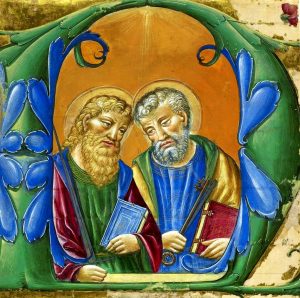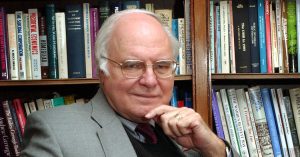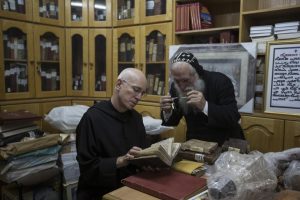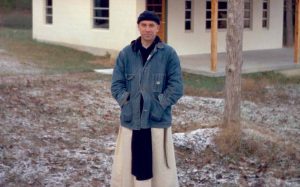 Mother Church liturgically remembers today the lives of Saints Peter and Paul. The Apostles Peter and Paul are known as the founders of our Church. As a point of fact, the Church has always considered St. Peter and St. Paul together —they are inseparable. Historically, we know them to born as Jews; each had a personal encounter with Jesus. And each had unique and unrepeatable set of gifts to offer. Both received the mission from Jesus Christ to make the Church a reality in Rome and thus for the world. Their vocation included the sacrifice of their lives in the service of the Gospel: St. Peter was crucified upside down and St. Paul, a Roman citizen, was beheaded with a sword. The point of drawing our attention to Sts. Peter and Paul is to ask if we follow the experience and teaching of these Holy Apostles who were great founders of our Church? Do we know them? Do we trust that their teaching directs our steps on the path that leads to heaven?
Mother Church liturgically remembers today the lives of Saints Peter and Paul. The Apostles Peter and Paul are known as the founders of our Church. As a point of fact, the Church has always considered St. Peter and St. Paul together —they are inseparable. Historically, we know them to born as Jews; each had a personal encounter with Jesus. And each had unique and unrepeatable set of gifts to offer. Both received the mission from Jesus Christ to make the Church a reality in Rome and thus for the world. Their vocation included the sacrifice of their lives in the service of the Gospel: St. Peter was crucified upside down and St. Paul, a Roman citizen, was beheaded with a sword. The point of drawing our attention to Sts. Peter and Paul is to ask if we follow the experience and teaching of these Holy Apostles who were great founders of our Church? Do we know them? Do we trust that their teaching directs our steps on the path that leads to heaven?
In 2009, Pope Benedict XVI preached the following homily to new archbishops, words appropriate for us to reflect upon for our formation of faith:
“‘In your hearts reverence Christ as Lord. Always be prepared to make a defense to anyone who calls you to account for the hope that is in you.’ Christian faith is hope. It paves the way to the future. And it is a hope that possesses reasonableness, a hope whose reason we can and must explain. Faith comes from the eternal Reason that entered our world and showed us the true God. Faith surpasses the capacity of our reason, just as love sees more than mere intelligence. But faith speaks to reason and in the dialectic confrontation can be a match for reason. It does not contradict it but keeps up with it and goes beyond it to introduce us into the greater Reason of God. It is our task not to let it remain merely a tradition but to recognize it as a response to our questions. Faith demands our rational participation, which is deepened and purified in a sharing of love. It is one of our duties … to penetrate faith with thought, to be able to show the reason for our hope within the debates of our time. Yet although it is so necessary thought alone does not suffice. Just as speaking alone does not suffice. In his baptismal and Eucharistic catechesis in chapter 2 of his Letter, Peter alludes to the Psalm used by the ancient Church in the context of communion, that is, to the verse which says: ‘O taste and see that the Lord is good!’ (Ps 34[33]: 8; 1 Pt 2: 3).
Tasting alone leads to seeing. Let us think of the disciples of Emmaus: it was only in convivial communion with Jesus, only in the breaking of the bread that their eyes were opened. Only in truly experienced communion with the Lord were they able to see. This applies to us all; over and above thinking and speaking, we need the experience of faith, the vital relationship with Jesus Christ. Faith must not remain theory: it must be life. If we encounter the Lord in the Sacrament, if we speak to him in prayer, if in the decisions of daily life we adhere to Christ then ‘we see’ more and more how good he is; then we experience how good it is to be with him. Moreover the capacity to communicate faith to others in a credible way stems from this certainty lived. The Curé d’Ars was not a great thinker; but he ‘tasted’ the Lord. He lived with him even in the details of daily life, as well as in the great demands of his pastoral ministry. In this way he became ‘one who sees.’ He had tasted so he knew that the Lord is good. Let us pray the Lord that he may grant us this ability to taste, and that we may thus become credible witnesses of the hope that is in us.”
(written/edited for the OLOP bulletin, 6/26/2016)





